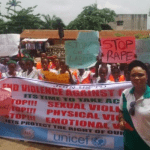The United Nations Children’s Fund (UNICEF) has called for increased investment in community healthcare systems across Nigeria to reduce maternal, neonatal, and child mortality rates in the country.
During a Media Dialogue held in Gombe to commemorate International Women’s Day, UNICEF also issued a warning to women against delivering babies at home to improve their chances of survival during and after childbirth.

UNICEF Health Officer, Oluseyi Olosunde, emphasized that empowering women will significantly address community healthcare challenges and reduce mortality rates.
He highlighted the lack of necessary facilities to address complications during home deliveries as a major concern.
Olosunde stated, “6 out of 10 child deliveries in Nigeria take place at home, and most of these are performed by unskilled birth attendants, posing a high risk to both mother and child.”
He attributed this practice to the slow decline in maternal and child morbidity rates.
 He however commended Taraba state for their positive review following their activities on immunization and increase enrolment of Mothers for ANCs in the last quarter.
He however commended Taraba state for their positive review following their activities on immunization and increase enrolment of Mothers for ANCs in the last quarter.
Dr. Tushar Rane, Chief of UNICEF Bauchi Field Office, emphasized the importance of gender equality and women’s well-being in building prosperous economies and fostering a healthy planet.
He highlighted the role of community-based women in health advocacy and education, stressing their ability to lead or participate in community health initiatives, such as vaccination campaigns.
The Media Dialogue involved journalists from Taraba, Gombe, Plateau, and Bauchi within the Bauchi UNICEF Zonal office’s jurisdiction.














